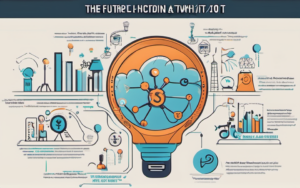The world is rapidly changing, driven by a relentless wave of innovation that is reshaping every facet of our lives. At the heart of this transformation lies a powerful force: emerging technologies. From the rise of artificial intelligence to the burgeoning metaverse, these technologies are poised to redefine how we live, work, and interact with the world around us. Their impact will be felt across industries, societies, and even our individual experiences, ushering in an era of unprecedented possibilities and challenges.
The Dawn of a New Era: Emerging Technologies and Their Impact
The Accelerating Pace of Innovation
Technological advancements are no longer a slow trickle, but a surging torrent. Moore’s Law, which predicts the doubling of computing power every two years, continues to hold true, fueling a constant cycle of innovation. This rapid pace has led to the development of transformative technologies that were once confined to science fiction, now becoming reality at an astonishing rate.
Disruptive Technologies Shaping Our Future
Emerging technologies are not merely incremental improvements; they are disruptive forces capable of transforming entire industries and reshaping our world. They have the potential to solve some of humanity’s most pressing challenges, from climate change to healthcare, while also creating new opportunities for economic growth and societal progress. Understanding these technologies and their implications is crucial for navigating the future and shaping its trajectory.
Artificial Intelligence: Redefining Intelligence and Automation
AI in Everyday Life: From Smart Assistants to Personalized Experiences
Artificial intelligence (AI) has become an integral part of our daily lives, from the voice assistants that answer our questions to the recommendation algorithms that personalize our online experiences. AI powers everything from smart home devices and navigation apps to social media platforms and personalized shopping recommendations. Its ability to process vast amounts of data and learn from patterns allows for tailored experiences that cater to our individual needs and preferences.
AI in Industry: Transforming Operations and Efficiency
Beyond our personal lives, AI is revolutionizing industries across the board. From manufacturing and logistics to finance and healthcare, AI is being used to automate tasks, optimize processes, and enhance decision-making. In manufacturing, AI-powered robots are taking on repetitive and dangerous tasks, increasing productivity and safety. In finance, AI is being used to detect fraud and analyze market trends, improving efficiency and reducing risk.
The Ethical Considerations of AI: Bias, Privacy, and Job Displacement
While AI offers immense potential, it also raises ethical considerations. Concerns about bias in AI algorithms, the potential for privacy violations, and the impact of automation on jobs are all issues that require careful attention. It is crucial to develop ethical frameworks and regulations to ensure that AI is used responsibly and benefits all of society.
The Metaverse: A New Frontier of Virtual Reality and Immersive Experiences
Beyond Gaming: The Metaverse as a Platform for Work, Socialization, and Entertainment
The metaverse, a collective term for immersive virtual worlds, is poised to become a central part of our lives. It promises a new way to interact with the world, blending elements of virtual reality (VR) and augmented reality (AR) to create a persistent and interconnected digital space. Beyond its use in gaming, the metaverse has the potential to revolutionize how we work, socialize, and even shop. Imagine attending virtual conferences, collaborating on projects in immersive environments, or enjoying concerts and festivals in shared digital spaces.
Building the Metaverse: Infrastructure, Technologies, and Challenges
Building the metaverse will require significant technological advancements in areas like high-speed internet, powerful hardware, and sophisticated software. The development of new technologies, such as haptic feedback devices and immersive displays, will be crucial for creating realistic and engaging experiences. There are also challenges to overcome, such as ensuring accessibility and inclusivity, addressing privacy concerns, and mitigating potential risks associated with the metaverse.
The Potential Impact of the Metaverse on Society and the Economy
The metaverse has the potential to create new industries, drive economic growth, and impact our social interactions in profound ways. It could lead to the emergence of new job roles, redefine the nature of work, and foster new forms of social connections. However, it is essential to consider the potential societal impacts of the metaverse and develop ethical guidelines to ensure that it benefits all of humanity.
Blockchain Technology: Decentralization and Trust in the Digital Age
Cryptocurrencies and the Rise of Decentralized Finance
Blockchain technology, the underlying technology behind cryptocurrencies like Bitcoin, has emerged as a powerful tool for creating secure and transparent systems. Blockchain allows for the creation of decentralized networks, where transactions are recorded on a shared ledger and verified by multiple parties, eliminating the need for a central authority. This has led to the rise of decentralized finance (DeFi), which offers alternative financial services without the need for traditional intermediaries.
Blockchain Beyond Finance: Applications in Supply Chain Management, Healthcare, and More
Beyond finance, blockchain is finding applications in a wide range of industries. In supply chain management, blockchain can be used to track products from origin to destination, ensuring transparency and accountability. In healthcare, blockchain can be used to securely store and share patient data, improving efficiency and reducing the risk of data breaches.
The Future of Blockchain: Scalability, Security, and Regulatory Landscape
The future of blockchain lies in addressing challenges related to scalability, security, and regulation. As blockchain technology continues to evolve, researchers and developers are working to improve its efficiency and security, while policymakers are grappling with how to regulate this emerging technology. The successful adoption of blockchain will depend on addressing these challenges and finding solutions that balance innovation with security and trust.
Biotechnology and the Future of Healthcare
Gene Editing and Personalized Medicine: Revolutionizing Disease Treatment and Prevention
Biotechnology is rapidly advancing, offering groundbreaking solutions in the field of healthcare. Gene editing technologies like CRISPR-Cas9 allow scientists to modify genes, potentially curing genetic diseases and preventing their transmission. Personalized medicine, which tailors treatments based on an individual’s genetic makeup, is transforming how we diagnose and treat diseases.
Artificial Organs and Bioprinting: Advancing Medical Solutions
Biotechnology is also leading to the development of artificial organs and bioprinting, which could revolutionize organ transplantation and tissue regeneration. Artificial organs, created using biocompatible materials, could provide a solution for patients waiting for organ transplants. Bioprinting, which uses 3D printing technology to create tissues and organs from living cells, holds the promise of personalized medical solutions and regenerative medicine.
The Ethical and Societal Implications of Biotechnology
The advancements in biotechnology raise ethical and societal questions. Concerns about genetic engineering, the potential for designer babies, and the equitable access to these technologies need to be addressed. It is essential to have open discussions about the implications of these technologies and develop ethical guidelines for their use.
The Future of Work: Automation, Skills Gap, and the Rise of the Gig Economy
The Impact of Automation on Jobs and the Workforce
Automation, driven by AI and robotics, is transforming the workplace, leading to increased efficiency and productivity, but also raising concerns about job displacement. While automation will eliminate some jobs, it will also create new roles and opportunities in areas like data analysis, software development, and AI engineering. The key to navigating this transition will be adapting to the changing demands of the workforce and developing skills that are in high demand.
The Importance of Adaptability and Lifelong Learning
In the future of work, adaptability and lifelong learning will be essential for success. The rapid pace of technological change means that individuals will need to constantly acquire new skills and knowledge to remain competitive in the workforce. This requires investing in education and training programs that prepare individuals for the evolving demands of the future.
The Future of Work: Remote Work, Flexible Schedules, and New Job Roles
The rise of remote work and flexible schedules is another trend shaping the future of work. As technology enables us to work from anywhere, the traditional office environment is becoming increasingly obsolete. This shift offers greater flexibility and work-life balance, but also presents challenges related to maintaining communication and fostering collaboration within distributed teams.
Embracing the Future with Innovation and Responsibility
Emerging technologies have the potential to transform our world in profound ways, offering solutions to some of our greatest challenges and creating new opportunities for progress. However, it is crucial to approach these technologies with a sense of responsibility and ethical awareness.
The development and deployment of emerging technologies should be guided by principles of inclusivity, sustainability, and human well-being. We need to ensure that these technologies benefit all of humanity and do not exacerbate existing inequalities.
Education and collaboration are key to navigating the future. We need to invest in education and training programs that prepare individuals for the jobs of tomorrow. We also need to foster international collaboration to address global challenges and ensure that the benefits of emerging technologies are shared by all. By embracing the opportunities and challenges of emerging technologies with innovation and responsibility, we can create a future that is both prosperous and sustainable.




